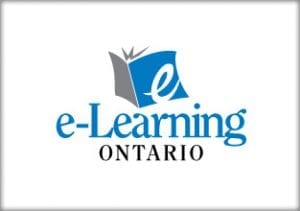What is e-Learning?
E-learning is essentially education via the Internet. E-learning is the electronic transfer of learning materials, skills and knowledge between teacher and students. It involves using electronic applications and processes to learn the subject. It is comparable to a regular ‘face to face’ course with regards to duration and expectations on the student.
The Purpose of e-Learning?
 The purpose of e-learning is to meet the needs of a wide range of learners, and is one of the components of the Ministry of Education’s Student Success/Learning to 18 initiative.
The purpose of e-learning is to meet the needs of a wide range of learners, and is one of the components of the Ministry of Education’s Student Success/Learning to 18 initiative.
Students may prefer e-learning for a variety of reasons. For example, with the permission of their home school, they might be able to take a course that’s not offered at their own school. Some may not be able to attend regular classes because they’re ill. Others simply love the flexibility of learning online. E-learning gives students skills they’ll need in post secondary education and the world of work. All courses are taught by qualified teachers from Catholic school boards across Ontario.
Who is eligible for e-learning?
Students enrolled in secondary schools in the HCDSB are eligible to enroll in an online course. Through the course
selection process, students apply, but will require permission to enroll in an online course. Students remain a
student of their home school even if the course is delivered by a teacher in another school, but the responsibility for the on-line course delivery, communication and marking is the responsibility of the on-line teacher, not the home school.
Who Should Apply?
Online learning is a wonderful way for some students to learn; however, this format may not be appropriate for all students. Online courses require a greater responsibility on the part of the student as they are expected to independently learn the course material.
Helpful attributes which will contribute to the success of a student in an e-learning course include:
- Computer literate
- A problem solver
- Self motivated
- Organized
- Responsible
- Self-directed
- A critical thinker
- Able to manage his/her time
- Honest
- Able to multitask
- An effective communicator
- Flexible – with a willingness to learn
How is a student assessed and evaluated in an e-learning course?
Assessment and evaluation will be done in accordance with the requirements in the Ontario Ministry of Education curriculum policy documents. Teachers require a body of evidence of learning in order to give a fair and comprehensive evaluation. When students don’t provide work for evaluation they jeopardize the possibility of receiving a good grade as there will be a lack of evidence that course expectations were met.

Students have serious responsibilities for assessment and evaluation and are expected to:
- Communicate with teachers in advance when legitimate difficulties interfere with meeting deadlines or assistance is required;
- Complete and submit assignments according to the timelines which teachers establish;
- View assessments as a way to help achieve better results when their work is evaluated;
- Think about and use teacher feedback to improve grades;
- In some cases students may be required to be in attendance at a specified site to complete a written Examination.
What are the responsibilities of the e-learning student?
The e-learning student is responsible for:
- applying for an e-learning course through his/her home school;
- participating in an e-learning orientation which may be face-to-face at a central location;
- following all school and board policies with respect to acceptable use and student conduct;
- Informing his/her Principal and/or Guidance Counselor if he/she wishes to withdraw from an e-learning course.
What are the behaviour expectations of e-learning students?
The Halton Catholic District School Board reserves the right to implement monitoring software to record and identify inappropriate use of the LMS.
- Users are expected to conduct themselves in a respectful, responsible and ethical manner while online. Because online communication is “faceless”, users sometimes forget that they are communicating with another person;
- Unethical behavior which may considered offensive, will not be tolerated;
- Users are expected to carefully consider the audience for a message and target the message using an appropriate distribution list or individual e-mail account. In replying to messages, consider whether the reply is best sent to an individual, group of individuals or all;
- Hardware, software, and other online resources which make up the e-Learning Ontario system are provided for the exclusive educational use of all students, parents and teachers and should not be otherwise copied, used or reused in any way, without the written consent of the Ministry of Education. These resources shall not be used for commercial purposes, product advertising, product/service purchasing, political lobbying, or political campaigning

- Users are not permitted to transmit, receive, submit, or publish any inappropriate materials as set by board policy;
- Users should only use appropriate Internet resources, which teachers or parents would approve;
- All assignments students submit and all tests students take shall be solely performed by them, except where it is requested that they participate in a group project. Students must not submit work that is plagiarized or otherwise violates copyright laws of Canada;
- Physical or electronic tampering with computer resources is not permitted and will result in cancellation of privileges;
- Using another user’s password or trespassing into someone’s folders, work, or files is prohibited. User accounts shall be used only by the authorized owner of the account. Users are responsible for all activity within their account;
- Users should not reveal personal information to anyone on the Internet or over the network unless instructed to do so by their teacher or parent/guardian;
- Users should never agree to meet or contact anyone they converse with online without their parents’/guardians’ approval;
Failure to observe these rules will result in loss of computer privileges and/or consequences consistent with the School Code of Behaviour. Users must respect all copyright laws that protect software owners, artists and writers. Plagiarism or the theft of intellectual property in any form is unacceptable.
What are the technology requirements?
 Learners participating in online courses should have access to computer equipment that meets or exceeds the following standards. Students with access to equipment that does not meet these standards, either at school or at home, may be able to participate, but they may also experience slow interactivity, limited interactions (e.g., no video streaming) and/or long wait periods for file downloads.
Learners participating in online courses should have access to computer equipment that meets or exceeds the following standards. Students with access to equipment that does not meet these standards, either at school or at home, may be able to participate, but they may also experience slow interactivity, limited interactions (e.g., no video streaming) and/or long wait periods for file downloads.
Student Services E-Learning

